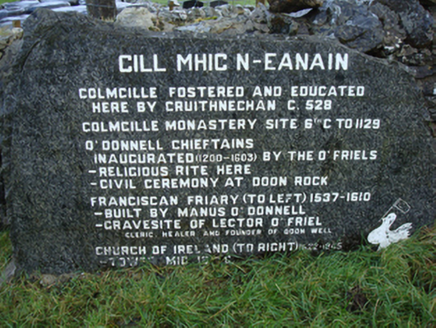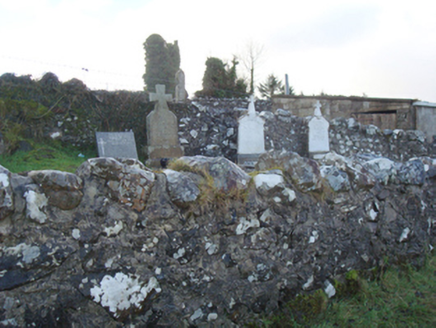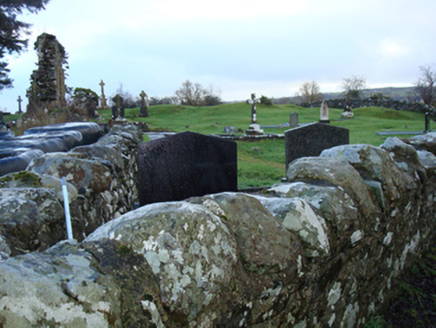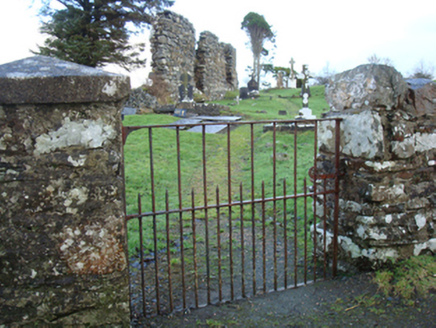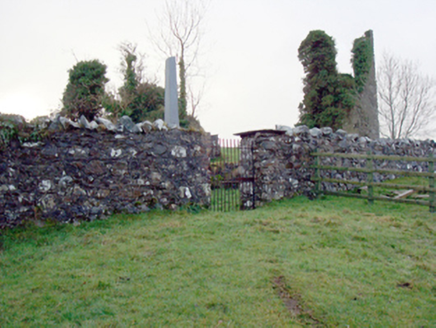Survey Data
Reg No
40822005
Rating
Regional
Categories of Special Interest
Archaeological, Architectural, Social
Original Use
Graveyard/cemetery
Historical Use
Friary
In Use As
Graveyard/cemetery
Date
1620 - 1800
Coordinates
214483, 420624
Date Recorded
05/01/2011
Date Updated
--/--/--
Description
Remains of former Church of Ireland church, built c. 1530 and altered c. 1733 and c. 1760, having remains of three-storey tower (on square-plan) to the south-west end, added c. 1760. Now derelict and partially demolished. Roof now collapsed\removed, originally pitched. Lower courses of rubble stone walls surviving to the north-west, south-east and north-east. Evidence of roughcast rendered surviving to tower. Lowest stage of tower converted into burial vault, after c. 1850. Church remains set in sub-rectangular enclosure having rubble stone boundary walls with rubble stone coping over. Gateway to the north-west having a pair of rubble stone gate piers (on square-plan) having flagstone coping over, and with a wrought-iron gate. Graveyard to site with collection of mainly upstanding twentieth-century gravemarkers and some nineteenth-century gravemarkers. Set back from road in the rural countryside to the north-east of Kilmacrenan. Remains of Franciscan friary (see RMP DG045-010002-), founded c. 1540, located to the north-east. Modern signage to north-west inscribed with information concerning site.
Appraisal
These ruins of the former Church of Ireland parish church are an interesting feature of some historic and archaeology interest in the rural landscape to the north-east of Kilmacrenan. The remains consist of a rectangular hall with a later tower attached to the south-west end. The original church was built sometime after 1622 (Royal Commission Report, 216) and was a simple hall-type rubble stone structure. It has altered in 1733 when the interior was wainscoted throughout and a marble floor was installed around the altar. The lack of bounding stones to the three-stage tower indicates that this is a later addition; its form suggests that it was added during the middle of the eighteenth century. The church remained in use until 1840-6 when the new Church of Ireland church (see 40822001) was built to the north-west end of Kilmacrenan. Lewis (1837) records that this earlier ruinous church is ‘a very old structure, which the Ecclesiastical Commissioners intend to rebuild’. This earlier church was demolished shortly after the construction of the new church, and some of the masonry may have been used to build the replacement building. The church is surrounded by a graveyard with mainly upstanding twentieth century gravemarkers, some of which are of modest artistic interest. The site is surrounded by a robust rubble stone boundary wall that may have been added c. 1860 to enclose the graveyard, which adds to the setting and context. This graveyard is of social interest to the local community. The gateway to site completes this composition. The remains of a Franciscan friary are found adjacent to the north-east. This was founded, probably after 1537, by Manus O'Donnell for the Franciscan Third Order Regular (Gwynn and Hadcock, 1970, 272). The remains consist of a rectangular church comprising nave and chancel without structural division. It is likely that much of the masonry from the friary was used to build the old Church of Ireland church to the south-west, and some remains of the friary are built into the exterior walls of the replacement Church of Ireland church (see 40822001) at Kilmacrenan to the west. The remains of the friary are surrounded by a graveyard (see RMP DG045-010002-) that, apparently, contains or contained the inauguration stone (see RMP DG045-010005-) of the O’Donnell clan (Ó Domhnaill), chiefs of Tir Conaill.
